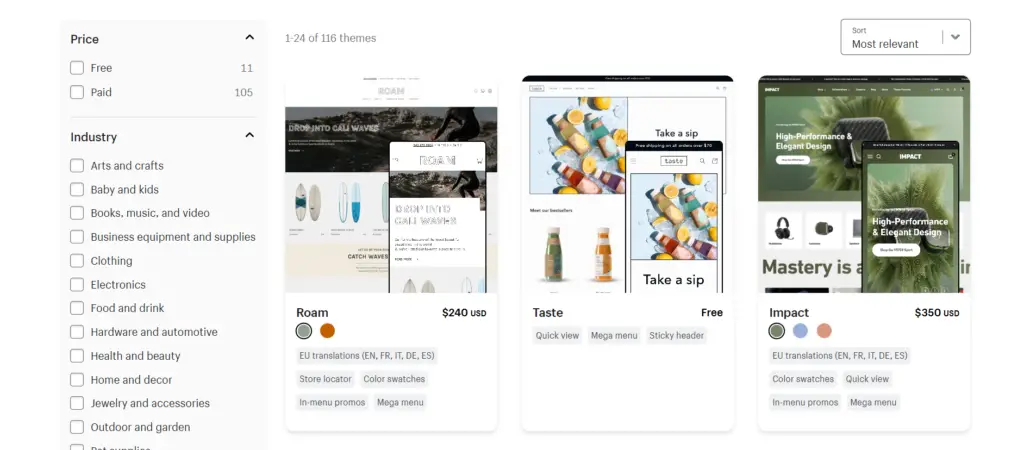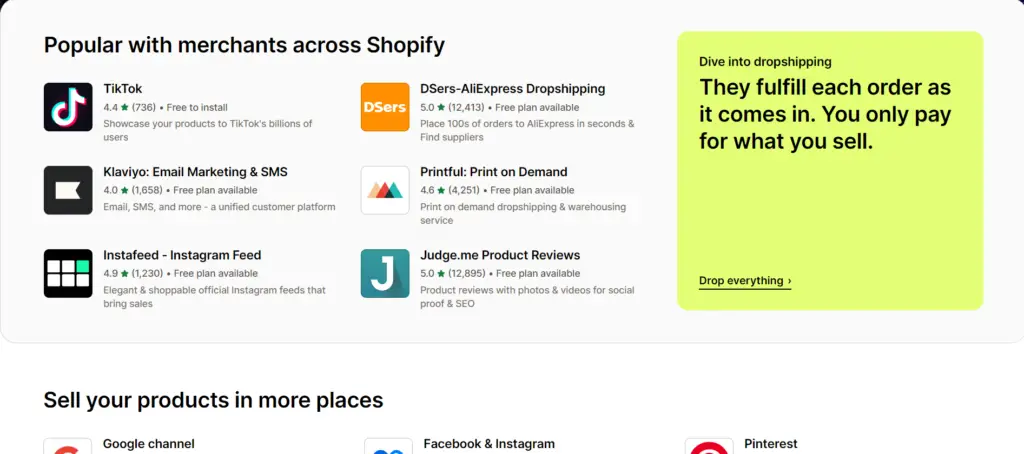Disclosure: Sportshubnet is supported by its audience. When you purchase through links on our site, we may earn an affiliate commission. Learn More.
In this post, we will check out the extensive review of Shopify in 2023.
Shopify is a popular e-commerce platform that allows businesses to create and manage their online stores.
It offers a wide range of features and tools to help businesses of all sizes sell their products and services online.
From creating a website and managing inventory to processing payments and tracking customer data, Shopify makes it easy for businesses to run their online operations.
In this review, we will take a closer look at the features and capabilities of Shopify and see how it can help businesses grow their online presence.
Shopify Review 2023
What is Shopify?

Shopify is a cloud-based e-commerce platform that allows individuals and businesses to create and manage an online store.
It provides tools for creating and customizing an online store, managing inventory, processing payments, and fulfilling orders.
Shopify also offers a variety of apps and integrations to expand the functionality of the store, such as social media integration, email marketing, and shipping and tax calculators.
It also provides analytics and reporting to help store owners track sales and customer behavior.
Who Can Use Shopify?
Anyone can use Shopify to create an online store, including individuals, small businesses, and larger companies.
It is suitable for a wide range of industries, including fashion, jewelry, art, home goods, and more.
Shopify also offers a variety of features and tools to help businesses with their online sales, marketing, and customer service needs.
How does Shopify work?
Shopify is a web-based e-commerce platform that allows businesses to create and manage their own online store.
It works by providing users with a variety of templates and tools to design and customize their store, including options for product listings, inventory management, payment processing, and shipping.
Users can create product listings, set prices, and manage inventory within the Shopify platform. Customers can then browse the store, add items to their cart, and complete the checkout process.
Shopify integrates with various payment gateways, such as Stripe and PayPal, to process payments and handle transactions.
Shopify also offers tools for tracking and analyzing sales data, managing customer orders and shipping, and marketing and SEO optimization.
Additionally, it allows for integration with various apps and plugins for additional functionality and tools.
Overall, Shopify streamlines the process of setting up and managing an online store, allowing businesses to focus on growing their business and making sales.
Shopify Themes

Shopify offers a variety of templates, also known as themes, that businesses can use to design their online store.
They offer 11 free templates that are fully responsive, meaning they will automatically adjust their layout to suit the screen size of the device they’re being viewed on.
Additionally, for those who prefer paid-for templates, there are 103 premium themes available. These premium themes range in price from $180 to $350 and are also fully responsive.
Businesses can browse through the templates using filters such as theme price, industry type, catalog size, and features to find the perfect theme for their store.
It’s worth noting that while all the free themes are officially supported by Shopify, businesses using a premium template may need to contact the developer for help with installation or customization queries.
If a business is looking for something truly unique, it is possible to access the Shopify theme code and develop its own template with the help of support materials, videos, and tutorials provided by Shopify.
Selling digital products
Shopify allows for the sale of digital products, but it’s not immediately obvious how to set it up.
To sell files, users need to install a separate app called the ‘Digital Downloads App’ which is free and easy to use.
It can be configured to work automatically so that a download link is given to the customer immediately after checkout and also emailed to them.
The file size limit for products sold is 5GB, which is quite generous compared to other platforms like Wix, BigCommerce, and Squarespace.
However, if 5GB is not enough, third-party apps or file-sharing services like Dropbox can be used to host and deliver larger files.
Shopify – Other Benefits
- Easy to use: Shopify is designed to be user-friendly, making it easy for anyone to set up and manage their online store, even if they have no technical expertise.
- Customizable: Shopify offers a wide range of customizable templates and design options, allowing you to create a unique look and feel for your store that reflects your brand.
- Mobile optimization: Shopify stores are optimized for mobile devices, ensuring that your customers can easily browse and make purchases on the go.
- Secure: Shopify is PCI compliant, which means that it meets the strict security standards required for online transactions.
- Built-in SEO: Shopify has built-in SEO features, making it easy for you to optimize your store for search engines, helping to increase visibility and drive more traffic to your site.
- Integrated payment gateways: Shopify offers a range of integrated payment gateways, including major credit cards and PayPal, making it easy for customers to make purchases in your store.
- App store: Shopify has an app store with a wide range of apps and plugins that can be integrated with your store to add extra functionality and improve the customer experience.
- Customer support: Shopify offers excellent customer support, including a knowledge base, community forum, and 24/7 support.
- Multilingual and multi-currency support: Shopify stores can be set up to support multiple languages and currencies, making it easy for you to sell to customers around the world.
- Reporting and analytics: Shopify provides detailed reporting and analytics, allowing you to track your store’s performance and make data-driven decisions to improve sales and customer engagement.
Shopify Features
Apps

Shopify offers a wide range of apps through its app store, with over 1,200 options to choose from. This makes it easy to add new features and functionality to your store as your business grows.
However, it’s important to be careful when adding apps to your site, as the cost of paid apps can quickly add up.
It’s also important to read reviews before installing an app to ensure that it is of good quality and will be beneficial for your store. Some ecommerce solutions, like Squarespace, offer built-in features that may not require the use of additional apps.
However, apps can be a useful tool for improving and expanding your store without needing technical skills or taking up a lot of time.
Dropshipping

Dropshipping is a great option for businesses looking to sell online as it requires minimal upfront investment and is relatively easy to manage.
Shopify, being one of the leading e-commerce platforms, supports dropshipping but it does not come as a built-in feature. To enable dropshipping on Shopify, you need to install a dropshipping app.
One of the most popular options for Shopify is DSers, which replaced Oberlo, which previously shut down.
This app allows you to easily import products from various suppliers, manage inventory, and automate order fulfillment, making it a convenient solution for running a dropshipping business on Shopify.
Abandoned Cart Recovery
Abandoned cart recovery is a powerful feature offered by Shopify that allows online store owners to recover lost sales due to customers leaving items in their cart without completing the purchase.
This feature automatically sends an email to customers who have abandoned their cart, reminding them of the items they left behind and providing them with a link to return to the checkout page.
This feature can be customized to include a special offer or discount to entice the customer to complete their purchase. Additionally, store owners can track the performance of their abandoned cart recovery emails and make adjustments to their strategy as needed.
Overall, abandoned cart recovery is a valuable tool for increasing sales and reducing lost revenue for online stores.
Product Management
Shopify’s product management features allow merchants to easily manage and organize their products on their online store.
This includes the ability to add, edit, and delete products, as well as organize them into collections and categories.
Additionally, Shopify allows merchants to set up different variations of a product, such as different sizes or colors, and manage inventory levels for each variation.
Shopify also offers the ability to set up product tags and options, making it easy for customers to filter and search for products in the store.
Overall, Shopify’s product management features provide a user-friendly and efficient way for merchants to manage their products and keep their stores organized.
Payment Options
Shopify offers a wide range of payment options to its customers, including over 100 different payment gateways such as PayPal, Stripe, Amazon Pay, and Apple Pay.
It also has its own payment gateway, Shopify Payments, which waives transaction fees. Shopify Payments allows you to sell in multiple currencies and automatically adjusts the price of products according to current exchange rates.
It supports multiple currencies like the Australian dollar, Canadian dollar, Danish Krone, Euro, Hong Kong dollar, Japanese yen, New Zealand dollar, Pound sterling, Singapore dollar, and United States dollar.
It ensures that all its stores are fully compliant with the Payment Card Industry (PCI), meaning that your store is secure and you don’t have to take any extra steps to ensure security.
Shopify Point of Sale

Shopify stands out from its competitors with its comprehensive Point of Sale (POS) functionality and hardware.
The POS system allows for not just online sales but also physical sales through a wide range of hardware such as card readers, barcode scanners, tills, and receipt printers.
Recently, Shopify introduced ‘Shopify POS Go’, a dedicated device that functions like a smartphone but with a built-in barcode scanner and card reader, connecting to your Shopify account over WiFi making it easy to get started with.
It retails at $399 and is currently available only to US Shopify merchants but it is expected to be rolled out to other countries in the future.
The POS is not available on the ‘Starter’ plan, and the ‘Shopify POS Pro’ add-on is required to get the most out of the point-of-sale features.
The cost for the ‘POS Pro’ add-on is $89 per month, per location. However, Shopify Plus plans include POS Pro.
The built-in POS features cover the basics, but the add-on is required for more advanced features such as unlimited store staff, staff roles and permissions, custom printed receipts, purchase orders, and sales attribution to staff members.
Shopify Review 2023 – Pros & Cons
Pros:
- User-friendly interface: Shopify is designed to be easy to use, even for those with little to no technical experience.
- Customizable themes: Shopify offers a wide range of customizable themes that can be easily tailored to suit the needs of any business.
- Built-in payment processing: Shopify offers built-in payment processing, which eliminates the need for businesses to set up a separate payment gateway.
- App store: Shopify has an extensive app store that offers a wide range of tools and plugins to enhance the functionality of your store.
- Scalable: Shopify can grow with your business, making it an ideal solution for small businesses looking to expand in the future.
Cons:
- Additional costs for apps and plugins: Some of the apps and plugins available in the Shopify app store come with additional costs, which can add up over time.
- Limited control over SEO: While Shopify does offer basic SEO features, some businesses may find that they have limited control over their SEO efforts.
- Not as easy to use as other platforms
Shopify Review 2023 – Pricing

Shopify offers five different pricing plans for businesses, each with varying monthly fees. The Starter plan is the most basic, costing $5 per month.
The Basic plan costs $29 per month, while the Shopify plan costs $79 per month. For more advanced features, businesses can opt for the Advanced plan, which costs $299 per month, or the Shopify Plus plan, which is custom-priced starting at $2,000 per month.
These prices are in USD, but the plans and features are the same for other countries, with fees in the local currency.
It’s worth noting that if you pay for your plan annually, you can receive a discount of up to 50% on the first year’s service. Additional fees apply for certain features such as point-of-sale.
A free trial is also available for three days, after which businesses can pay $1 for three months of access to the platform before regular fees apply.
Which Plan is Best? – Our Recommendation
Our recommendation for those looking to start selling quickly with minimal effort is, to begin with the Shopify Starter plan.
However, for those who want a more comprehensive online store experience, we suggest starting with the Basic Shopify plan for $29 per month.
This plan offers a wide range of features and tools that provide excellent value for the price. Also, Shopify provides a 14-day free trial period, so it’s best to take advantage of that before committing to a plan.
How Shopify Stacks Up
Shopify, Squarespace, and Wix are all popular website builders that offer e-commerce functionality.
However, they differ in terms of cost, templates, and features. Shopify is specifically designed for e-commerce and offers unlimited storage on all plans, while Wix and Squarespace only offer e-commerce functionality on certain plans, and may have limited storage.
In terms of cost, Wix has the most affordable e-commerce plans, ranging from $23 to $49 a month, while Shopify’s plans range from $29 to $299 a month.
Squarespace offers e-commerce functionality on its Business, Basic Commerce, and Advanced Commerce plans, which range from $18 to $40 per month.
Squarespace has an edge in terms of stunning visual design, but Shopify integrates with more e-commerce-related apps, making it a more robust online store builder.
Is Shopify Safe to Use?
Yes, Shopify is a safe and secure platform to use for building and managing an online store.
They use industry-standard encryption and security protocols to protect sensitive customer information and transactions.
Additionally, Shopify is PCI compliant, meaning it meets the necessary security standards for accepting online payments.
Shopify also offers various tools and resources to help store owners protect their sites from fraud and other security threats.
Is Shopify Right for You or Your Business?
Shopify is a great platform for small to medium-sized businesses looking to start an online store. It offers a user-friendly interface, a wide range of templates and themes, and a variety of apps and plugins to enhance the functionality of your store.
It also provides a secure and reliable hosting service, making it easy for you to manage your store and focus on growing your business.
However, Shopify may not be the best choice for businesses with large inventory needs or those that require a highly customized store. In these cases, it may be better to use a more advanced e-commerce platform.
Before deciding if Shopify is right for you, it’s important to consider your specific business needs and goals. It’s also a good idea to explore the platform and its features, as well as to read reviews from other users to get a better understanding of what to expect.
Support
Shopify is known for its exceptional customer support, offering various channels for users to reach out for help.
From 24/7 phone support to live chat and email, Shopify has a wide range of options to support users.
The Shopify Help Center is also a great resource for finding answers to common questions, and video tutorials are available for those who prefer visual instruction.
Additionally, the Shopify Plus plan offers advanced specialist support with a dedicated support agent.
Overall, Shopify is one of the only ecommerce builders that offer 24/7 support, making it a great option for those who may need assistance outside of typical business hours.
Shopify Alternatives
There are several alternatives to Shopify that offer different features and pricing options. Some of the top alternatives include:
- Wix eCommerce – A website builder that offers ecommerce plans starting at $27 per month. It has great sales tools, a high score in ease of use, and is known for its design functionality. It may not be suitable for larger stores but is ideal for small stores that prioritize branding.
- Squarespace – Another website builder/ecommerce hybrid, known for its stunning templates and ability to give users near-complete creative control. It scores well in terms of design functionality and value for money and has the highest score in ease of use.
- Square Online – Best suited for vendors with lower volume sales or brick-and-mortar businesses looking to expand online. It has a simple setup process and offers a variety of design options.
- BigCommerce – A popular option for larger businesses, it offers a wide range of features and integrations. It is known for its scalability and flexibility but has a steeper learning curve and higher pricing options.
- Volusion – A platform known for its ease of use and customer support, it offers a variety of design options and tools. It may not have as many features as some of the other alternatives, but it is still a solid option for small to medium-sized businesses.
Shopify Review 2023: conclusion
Overall, Shopify is a solid ecommerce platform that offers a wide range of features and tools for small to medium-sized businesses.
It is user-friendly and easy to navigate, making it a great option for those who are new to building an online store.
Shopify also offers a variety of customizable templates, as well as a robust app store, which allows users to add additional functionality to their store.
Additionally, their customer support is top notch and their pricing plans are competitive. However, it’s not the most affordable option for businesses with a large inventory and it may be more difficult for users with no coding experience to make big customizations.
Overall, Shopify is a great choice for businesses looking to build a professional and functional online store.
Inbox looking a bit bland?
Better sign up to our blog to cram it full of trending Sports, Gaming & Tech updates.




